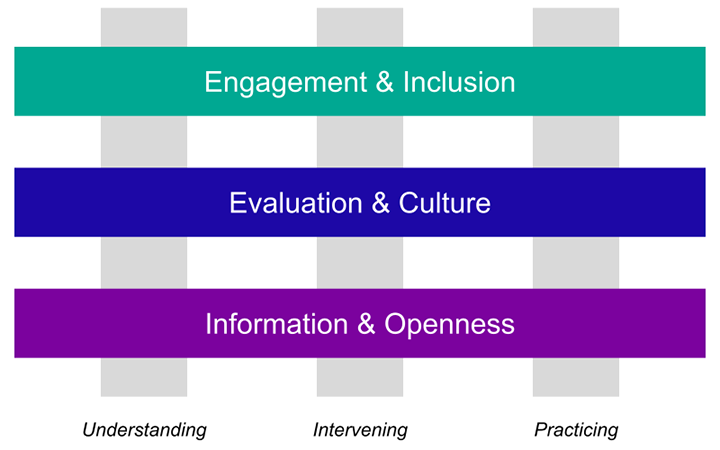The focal areas of CWTS
In this post the directors of CWTS introduce the three focal areas of the centre. These focal areas were established on January 1, 2023 as part of the launch of the CWTS knowledge agenda 2023-2028.
In a previous blog post we introduced the CWTS knowledge agenda 2023-2028. Building on this, in the current post we present the new focal areas in which CWTS organizes its activities. These focal areas address key challenges in the way science is practiced and governed, in particular challenges for which we believe our centre is uniquely positioned to make a difference and to contribute to transformative changes.

Focal areas
Most of our activities at CWTS take place in three focal areas: Engagement & Inclusion, Evaluation & Culture, and Information & Openness. These focal areas were launched on January 1, 2023, replacing the three research groups in which CWTS was organized until the end of 2022. While the research groups represented disciplinary traditions in science studies research, the focal areas are organized around key challenges faced by the research system. This reflects a major shift in our way of working at CWTS.
Each focal area consists of a core group of about eight to ten senior staff members and a broader group of PhD candidates and other early-career staff members as well as visiting researchers. A focal area has a small coordinating team that includes both senior researchers and a colleague with expertise in project coordination. To benefit from synergies between the focal areas, several staff members are contributing to two areas.
The box below summarizes the topics addressed by the focal areas. While each focal area covers a distinct set of problems, the areas are also closely interconnected. The selection of the topics addressed by the focal areas is the outcome of an intensive consultative process involving the entire CWTS team. By focusing on these topics, we aim to set clear priorities and to maximize the impact of our work. The importance of setting priorities was emphasized in the evaluation of our centre that took place last year. In its advice, the evaluation committee also identified topics that it felt may deserve more attention in the work of our centre. The suggestions made by the committee have proven very useful in defining the focal areas.
Engagement & Inclusion
The focal area Engagement & Inclusion aims to contribute to a more collaborative, engaged, and inclusive research system. We believe in promoting diversity and inclusion in the global scientific workforce, and in recognizing the essential role that communication and co-creation of scholarly activities play in strengthening such a diverse system. The focal area approaches these questions through strategic ambitions around the three pillars of the CWTS knowledge agenda: understanding, intervening, and practicing. Examples of such ambitions include improving our understanding of the role of epistemic diversity in knowledge creation, developing policy recommendations for more inclusive and diverse academic careers, and taking more proactive measures to co-create our own activities with a larger variety of societal stakeholders (e.g., NGOs, educational organizations, and citizens).
Evaluation & Culture
The focal area Evaluation & Culture is concerned with the many different ways in which research is evaluated, for instance through assessment of research institutions and individual researchers, and through peer review in publishing and funding contexts. Recognizing the mutual shaping of research and research evaluation, we are committed to promoting forms of evaluation that are suited to diverse knowledge making practices and that foster healthy and inclusive academic working environments. The focal area combines activities in the understanding, intervening, and practicing pillars of the CWTS knowledge agenda. We want to better understand how research evaluation in its many forms conditions research agendas, notions of quality, and daily practices of research and scholarly communication. In addition, we aim to use our insights to promote positive change, for example by advising institutions like universities and funding bodies on how to organize evaluation for epistemic and social inclusivity, diversity, and openness. Lastly, we aim to practice our values by constantly reflecting on how we do evaluation in our immediate working environment.
Information & Openness
The focal area Information & Openness is concerned with studying and advancing openness of research information, such as information about the activities and outputs of researchers and research institutions. We believe that openness of research information can play an important role in fostering responsible research assessment practices and promoting global inclusiveness in science. The activities of the focal area revolve around the understanding, intervening, and practicing pillars of the CWTS knowledge agenda. We aim to develop a deep understanding of the open research information landscape and to monitor the openness of research information. We also intend to develop initiatives that promote openness of research information as the norm for scientometric analyses. In addition, we are putting the use of open research information into practice in our own work. The work of CWTS will increasingly be based on open rather than closed research information, making our work more transparent, reproducible, and inclusive.
Strategic ambitions
The focal areas are currently developing strategic ambitions for the period 2023-2028. Each focal area organizes its strategic ambitions in three pillars:
Understanding: Ambitions that focus on developing a deeper understanding of the problems addressed in the focal area.
Intervening: Ambitions that contribute to improving the research system, for instance through Horizon Europe projects, products and services of CWTS BV, and also through training, advocacy, and contributions to policy making.
Practicing: Ambitions that contribute to improving our own way of working at CWTS (‘practice what we preach’).
While a research centre may traditionally be expected to focus primarily on understanding, for our centre intervening is of equal importance. As discussed in our previous blog post, the mission of CWTS is to improve how science is practiced and governed and how it serves society. Realizing this mission requires us to invest our efforts both in understanding and in intervening. In addition, recognizing that we are part of the research system ourselves, we also feel a special responsibility to improve our own way of working by practicing what we preach, for instance in areas such as open science and recognition and rewards.
At the moment the focal areas are working hard to finalize the development of their strategic ambitions in the understanding, intervening, and practicing pillars. They expect to announce their plans in the coming months.
Next steps
The focal areas, along with new ambitions in the understanding, intervening, and practicing pillars, represent a major change in our way of working at CWTS. The full implementation of these key elements in the CWTS knowledge agenda 2023-2028 will take time. We therefore see 2023 and 2024 as a transition period in which the knowledge agenda will be further elaborated and fine-tuned and in which the introduction of a new way of working at our centre will be completed.
We expect that the Leiden Madtrics blog will be used to provide further updates on the development of the knowledge agenda and the focal areas. Keep an eye on future blog posts!
We thank the focal area coordinators for preparing the brief descriptions of the focal areas presented in this blog post.





0 Comments
Add a comment